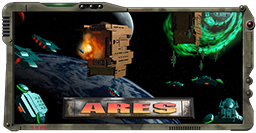
Escape Velocity is a single-player role-playing space trading and combat video game series first introduced in 1996 by Ambrosia Software for the Apple Macintosh. Two other similar games based on the original, EV Override and EV Nova, followed in 1998 and 2002 respectively, the latter of which is also available on Microsoft Windows. In addition there is a trading card game available based on the storyline of the EV Nova universe.
Escape Velocity Nova is a video game developed by Ambrosia Software in collaboration with ATMOS. It is the third game in the Escape Velocity series of space trading and combat games. It was released on March 19, 2002 for Mac OS X and Mac OS 9, and later ported to Windows and released on July 11, 2003. The game's premise, set in a time period after mankind has discovered hyperspace technology, grants the player freedom to take missions, trade goods, steal from other ships, and enter one of six storylines.
StuffIt is a discontinued family of computer software utilities for archiving and compressing files. Originally produced for the Macintosh, versions for Microsoft Windows, Linux (x86), and Sun Solaris were later created. The proprietary compression format used by the StuffIt utilities is also termed StuffIt.

The Tapwave Zodiac is a mobile entertainment console. Tapwave announced the system in May 2003 and began shipping in October of that same year. The Zodiac was designed to be a high-performance mobile entertainment system centered on video games, music, photos, and video for 18- to 34-year-old gamers and technology enthusiasts. By running an enhanced version of the Palm Operating System (5.2T), Zodiac also provided access to Palm's personal information management software and many other applications from the Palm developer community. The company was based in Mountain View, California.

Rogue Amoeba Software, Inc. is a software company that produces audio software, specializing in applications for audio capture for the Macintosh platform. Rogue Amoeba's best-known products are Audio Hijack and Audio Hijack Pro. The Audio Hijack programs allow for users to capture and record audio from any program running under macOS. The Pro version adds support for VST, Audio Unit, and LADSPA plugins, among other features.

Maelstrom is a video game developed by Andrew Welch, released as shareware in November 1992 for Mac OS. The game is an enhanced clone of Atari, Inc.'s 1979 Asteroids arcade game with a visual style similar to the Atari Games 1987 sequel, Blasteroids. Maelstrom was released when there were few action games for the high-resolution color displays of the Macintosh, so it garnered much interest, despite the dated concept, and led to the creation of Ambrosia Software.

A Macintosh clone is a computer running the Mac OS operating system that was not produced by Apple Inc. The earliest Mac clones were based on emulators and reverse-engineered Macintosh ROMs. During Apple's short lived Mac OS 7 licensing program, authorized Mac clone makers were able to either purchase 100% compatible motherboards or build their own hardware using licensed Mac reference designs.

Logic Pro is a proprietary digital audio workstation (DAW) and MIDI sequencer software application for the macOS platform developed by Apple Inc. It was originally created in the early 1990s as Notator Logic, or Logic, by German software developer C-Lab which later went by Emagic. Apple acquired Emagic in 2002 and renamed Logic to Logic Pro. It is the second most popular DAW – after Ableton Live – according to a survey conducted in 2015.
Xara is an international software company founded in 1981, with an HQ in Berlin and development office in Hemel Hempstead, UK. It has developed software for a variety of computer platforms, in chronological order: the Acorn Atom, BBC Micro, Z88, Atari ST, Acorn Archimedes, Microsoft Windows, Linux, and more recently web browser-based services.

Apeiron is a Macintosh game developed and released as shareware by Ambrosia Software. An adaptation of the 1980 arcade game Centipede, it was first released on February 11, 1995. In November 2004, a Mac OS X port was made available.

Casady & Greene was a software publisher and developer active from 1988 to 2003. The company primarily released software for Macintosh, but also released software for Windows and Newton. Casady & Greene was formed in 1988 when Greene, Inc. acquired CasadyWare, a company owned by Robin Casady.

Unsanity was a macOS shareware software developer founded in May 2000, notable for coining the term "haxie". Unsanity produced Mac utilities that relied on their own Application Enhancer, a utility that modified the system and other applications. Software incompatibility with Mac OS X Leopard, Snow Leopard, and Lion ended Unsanity's offerings.

Ares is a space strategy video game created by Nathan Lamont of Bigger Planet Software, and first released by Changeling Software in 1998. In 1999 the game was re-released as shareware by Ambrosia Software and released as open source software and freeware in 2008. The key feature of the game was its ability to zoom in and out smoothly; this allowed the player to switch between a close-up view, which emphasized space combat skills, and a strategic view of the entire map.
Amiga software is computer software engineered to run on the Amiga personal computer. Amiga software covers many applications, including productivity, digital art, games, commercial, freeware and hobbyist products. The market was active in the late 1980s and early 1990s but then dwindled. Most Amiga products were originally created directly for the Amiga computer, and were not ported from other platforms.

Pillars of Garendall is a role-playing video game that was built by Beenox Studios and Ambrosia Software. It was built using the Coldstone game engine, which was also a joint Beenox/Ambrosia project. The game was released in 2001 for Mac OS Classic, Microsoft Windows and Mac OS X.

RemoteAccess is a DOS Bulletin Board System (BBS) software package written by Andrew Milner and published by his company Wantree Development in Australia. RemoteAccess was written in Turbo Pascal with some Assembly Language routines. RemoteAccess began in 1989 as a clone of QuickBBS by Adam Hudson. It was released under the shareware concept in 1990 and became popular in North America, Europe, UK, South Africa, and the South Pacific. Initially the main advantage over QuickBBS was its ability to run multiple nodes under Microsoft Windows, Quarterdeck's DESQview and OS/2. RA could also operate over a network or even a combination of network and multitasking operating systems to provide multiple "nodes per station" capabilities.
Escape Velocity Override is a space trading simulator game written by Peter Cartwright, with the support of his school-friends, and developed by Ambrosia Software for the Apple Macintosh. It is the sequel to Escape Velocity with an extended version of the original game engine, but Override has an entirely new story line set in a different, larger universe.
Patrick Buckland is a British video game programmer, designer and chief executive officer of Stainless Games, which he co-founded with Neil Barnden in 1994.

Carbon Copy Cloner is a backup and disk cloning utility for macOS made by Bombich.











